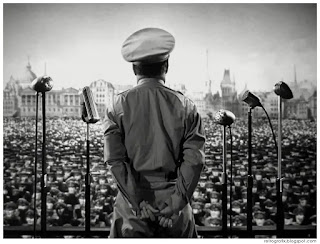If we remember
Michael Warner's phrase for new historicism-
"The
text is historical and history is textual"
We can able to
relate it with the allegorical and satirical films of Chaplin. Chaplin, through
his works, provides the audience with an insight towards the social and political
background of the 20th-century Modern world. Modernism is thought
of tremendous agony within the self. 1820 was the prime time of modernism. The
Great Dictator is a 1940 American political satire comedy-drama film by a polymath
and British comedian Charlie Chaplin. Let us have some insight and
understanding at some of the key features of Modernism which Chaplin was
successful in highlighting through his works.
The world knows Charlie Chaplin as one of the greatest comedians till date as because he had subtlety in his art that he served the mundanity and hardships of daily lives of workers and proletarian class with comic relief and at the same moment providing almost justice to their integrity and their social conditions.
This blog post reflects the understanding of his two films with reference to the 20th century modernist movement and its social, political and economical impact on the people, the rise of fascism and nazism and the sufferings of jews and intellectuals as portrayed in ' Modern Times' and 'The Great Dictator'.
Click here to view the blog on 'Modern Times'.
'THE GREAT DICTATOR'
Neil Hurley remarks- "If any one person has dominated the film industry by the scope of his creative genius, it has been Chaplin...where others have sought by means of the word, spoken or written, to promote social justice and a better understanding of personal human dignity, Chaplin succeeded in spreading his social gospel by his pantomine."
'The tramp' played by Charlie Chaplin in his
slapstick comedies reflect his genuine efforts on how he modified the course
of monochromatic films by colouring it with his comic vision and silent satire
which if examined deeply presents the burst of roars of wage earners and tumult of the time.
The film 'Great Dictator' is made in a language which the common people are hardly able to understand. It is noteworthy to observe how the film captures the elements of Nazism and Fascism in the film. It can be said an allegorical version of rise of high time of dictatorship.
Here is my reading of some frames.
This film offers huge speeches of the dictator. Among which the two are delivered by Hynkel in his most extraordinary language which is 'ununderstandable' for many of us and the third and the last speech delivered by the Barber ( a common human, the Jew) is sentimental and lefts deep impressions of fading humanity - a crusading stance on the dictatorial rule and its catastrophes. The film starts with the frame as mentioned below.
And one of the most significant frames is of Hynkel dreaming to conquer.
One thing that Hynkel with all his power can never touch is "SKY". The cruelty and barbarity of Hynkel's stroomstropers.
Thank you.







Post a Comment